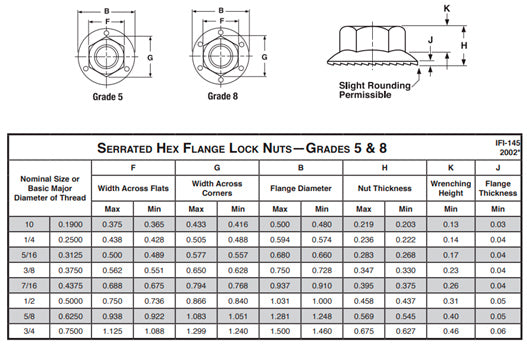
Quick Facts
Flange nuts are a type of fastener known for their unique design, featuring an integrated flange or washer-like structure. These nuts are commonly used in various industries and applications where vibration resistance, secure fastening, and ease of installation are crucial.
Flange nuts are essentially nuts with an enlarged, flat, and circular flange at one end. This flange serves multiple purposes:
- Distribution of Load: The flange provides a broader bearing surface, which helps distribute the clamping load over a larger area. This feature prevents damage to the material being fastened and reduces the risk of over-tightening.
- Vibration Resistance: Flange nuts are especially effective in applications where vibration is a concern. The flange creates a locking effect, minimizing the chances of the nut loosening due to vibrations.
- Alignment Assistance: The flange can assist in aligning the fastener during installation, making it easier to position the nut accurately.
- Sealing: In some applications, the flange nut can serve as a seal against moisture, dust, or other contaminants, helping to maintain the integrity of the joint.
Common Types of Flange Nuts
There are several types of flange nuts, each designed for specific applications. The two most common types are:
-
Serrated Flange Nuts: These flange nuts have serrations (small ridges or teeth) on the underside of the flange. The serrations grip the surface of the material, providing increased resistance to loosening due to vibrations. Serrated flange nuts are often used in automotive and machinery applications. See specifications below.

-
Non-Serrated Flange Nuts: Unlike serrated flange nuts, non-serrated flange nuts have a smooth underside. They are commonly used in applications where marring or damaging the surface of the material is a concern. See specifications below.

Bolts Used with Flange Nuts
Flange nuts are typically used with bolts or threaded fasteners that have a compatible thread pitch and size. The choice of bolt depends on the specific application's requirements. Common types of bolts used with flange nuts include:
- Hex Head Bolts: Hexagonal head bolts, often referred to as hex bolts, are a common choice when paired with flange nuts. They provide a sturdy and reliable connection and are widely used in construction, machinery, and structural applications.
- Socket Cap Screws: Socket cap screws are another option when using flange nuts. They have a recessed hexagonal socket in their head, allowing for secure tightening with an Allen wrench or hex key. Socket cap screws are often used in precision equipment and machinery.
- Carriage Bolts: Carriage bolts have a round head with a square shoulder just beneath it. Flange nuts are used with carriage bolts when a smooth and finished appearance is desired. These are commonly found in outdoor furniture and wooden structures.
- Stud Bolts: In applications where flange connections are prevalent, stud bolts and flange nuts are used together to create a reliable and leak-proof joint. This combination is commonly employed in the oil and gas industry for connecting pipelines and flanges.